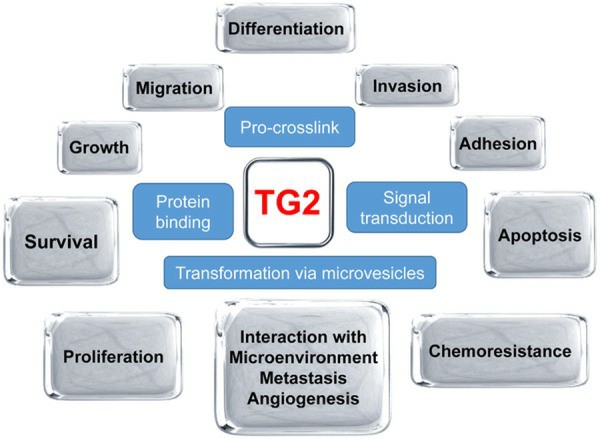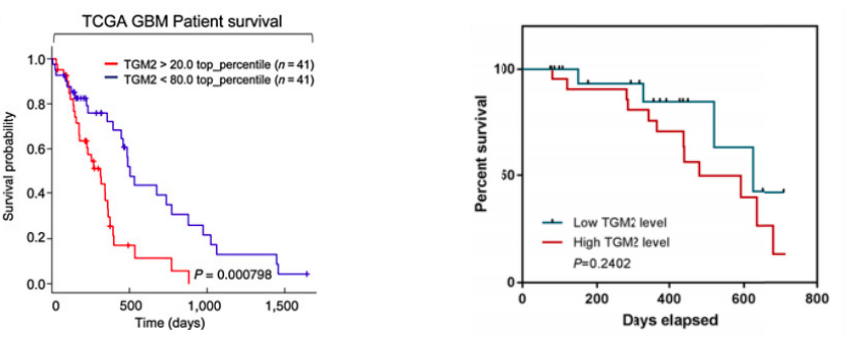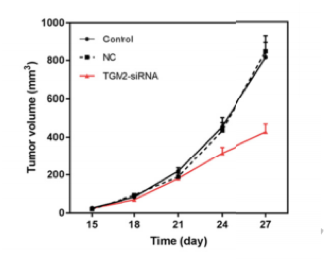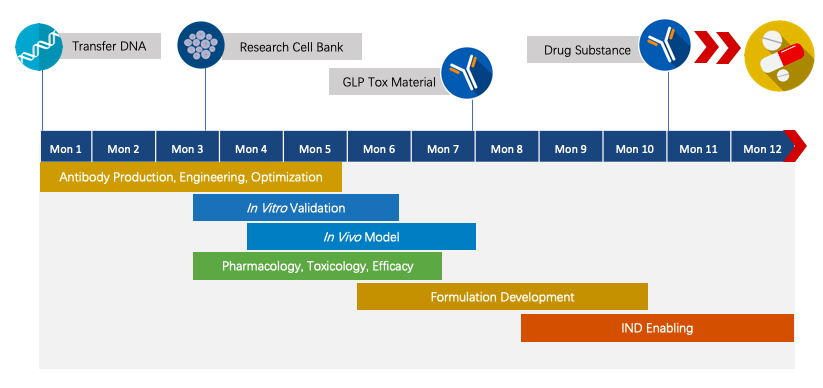About This Program
This program aims to develop anti-TGM2 therapeutic monoclonal antibody for immuno-oncology.
Rationale when developing the program:
-
TGM2 participates in various physiological and pathological reactions such as cell growth, differentiation, remodeling, and stabilization of extracellular matrix.
-
Multiple studies have shown that TGM2 protein expression closely relates to cancer pathogenesis, atherosclerosis, and neurodegenerative diseases.
-
TGM2 level is shown to be elevated in malignant tumors such as breast, colon, and ovarian cancer.
-
TGM2 activity is up-regulated by various stressors, including tissue damage and inflammation, inflammatory cytokines and reactive oxygen species.
TGM2
Tissue transglutaminase (TGM2), a member of the transglutaminase family, is a multifunctional macromolecular protein mainly locates in the cytoplasm of cells. Some TGM2 may be secreted into the extracellular matrix, allowing different cells to exert anti-apoptotic or pro-apoptotic effects.
Highlighted Functions:
-
TG2 is a multifunctional enzyme that participates in cross-linking, cell adhesion, protein disulfide isomerase, kinase and scaffold activity.
-
TG2 expression leads to constitutive activation of FAK, Akt and NF-κB, and these signaling pathways are involved in the progression of cancer.
-
TG2-induced glucose metabolism may interfere with cancer metastasis.
-
Due to the versatility of TG2, it has been reported that its effects may show opposite effects in the same physiological and pathological system at the same time.
 Fig.1 TG2 regulates various biological behaviors of tumor cells (shown in grey boxes) via four major mechanisms (shown in blue boxes). TG2, transglutaminase 2.3
Fig.1 TG2 regulates various biological behaviors of tumor cells (shown in grey boxes) via four major mechanisms (shown in blue boxes). TG2, transglutaminase 2.3
TGM2 in Cancer Studies
Here are some published data about TGM2 working as a potential target for cancer immunotherapy.
-
TGM2 expression is negatively associated with overall survival in GBM and colorectal Cancer.
 Fig.2 The survival analysis of GBM and colorectal cancer patients with different levels of TGM2 expression.1,2
Fig.2 The survival analysis of GBM and colorectal cancer patients with different levels of TGM2 expression.1,2
-
TGM2 interference inhibits tumorigenesis in CRC.
 Fig.3 The tumor volumes in TGM2-siRNA group were significantly smaller at day 15, 18, 21, 24 and 27.2
Fig.3 The tumor volumes in TGM2-siRNA group were significantly smaller at day 15, 18, 21, 24 and 27.2
Ongoing Clinical Trials
-
Currently, to the best of our knowledge, NO anti-TGM2 therapeutic monoclonal antibodies are being evaluated in clinical trials.
-
In this case, TGM2 is still a compelling target for cancer immunotherapy. In an effort to optimally leverage TGM2-mediated immune response, our next generation of TGM2 targeting treatment attempts to explore combination therapy trials by invoicing other immunomodulatory agents.
Program Planning and Management
Creative Biolabs has extensive knowledge in end-to-end program development. For each program, we are committed to delivering the final complete program to our clients within 1.5 years before entering the IND stage.
 Fig.4 Project pipeline management of therapeutic monoclonal antibody.
Fig.4 Project pipeline management of therapeutic monoclonal antibody.
Cooperation
Creative Biolabs is looking for potential partners (include but not limit to major pharma or biotech firms) to develop anti-TGM2 therapeutic monoclonal antibody program together. Our scientists are dedicated to bringing years of valuable experience to our partner and achieve a meaningful partnership. For any partners interest in our Next-IO™ programs, Creative Biolabs welcomes collaboration.
Here are two ways for your choice, and please contact us for more details.
1) Collaborate with us and co-develop the programs from the discovery phase to IND enabling. Costs will be shared.
2) Become a licensed candidate for our programs.
With our quality control protocol and knowledge of global regulatory requirements, we can help our partners advance their programs with more chance to succeed. Look forward to cooperating with you in the near future.


 Fig.1 TG2 regulates various biological behaviors of tumor cells (shown in grey boxes) via four major mechanisms (shown in blue boxes). TG2, transglutaminase 2.3
Fig.1 TG2 regulates various biological behaviors of tumor cells (shown in grey boxes) via four major mechanisms (shown in blue boxes). TG2, transglutaminase 2.3
 Fig.2 The survival analysis of GBM and colorectal cancer patients with different levels of TGM2 expression.1,2
Fig.2 The survival analysis of GBM and colorectal cancer patients with different levels of TGM2 expression.1,2
 Fig.3 The tumor volumes in TGM2-siRNA group were significantly smaller at day 15, 18, 21, 24 and 27.2
Fig.3 The tumor volumes in TGM2-siRNA group were significantly smaller at day 15, 18, 21, 24 and 27.2
 Fig.4 Project pipeline management of therapeutic monoclonal antibody.
Fig.4 Project pipeline management of therapeutic monoclonal antibody.
 Download our brochure
Download our brochure